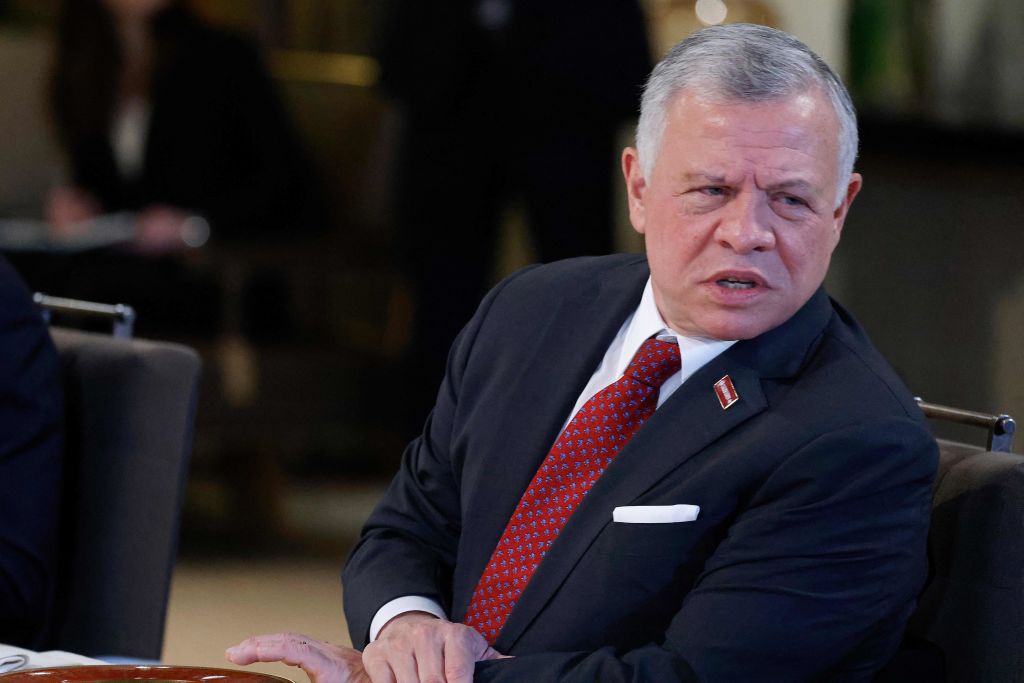The month-long Muslim holiday of Ramadan ends today, and the Middle East appears to have narrowly averted a war. Just days ago, the Islamic Republic of Iran threatened to wipe the Israeli cities of Haifa and Tel Aviv off the map. This came in wake of statements by Supreme Leader Ayatollah Ali Khamenei touting his coordination of terrorist groups that recently attacked Israel. Iran-backed violence was reported this month in Gaza, Lebanon, Syria, the West Bank and Jerusalem.
Amid these heightened tensions, the United States dispatched the USS Florida nuclear submarine, equipped with more than 150 tomahawk missiles, to deter Iran from further provocation. Pragmatic Arab states like the United Arab Emirates and Egypt were working overtime to defuse tensions.
One American ally, however, appeared content to fan the flames: the Hashemite Kingdom of Jordan.
Jordan’s King Abdullah II two weeks ago called upon “every Muslim to deter Israeli escalation against… holy sites in Jerusalem.” The following night, Palestinian youth barricaded themselves in the Al-Aqsa mosque, then shot fireworks at Israeli police attempting to clear the compound.
Jordan’s fiery rhetoric is not new. The worst of it comes during the Muslim holiday of Ramadan each year.
Prior to the 2021 war between Israel and Hamas, the regime accused Israel of being “barbaric” for confronting Palestinian violence on the Temple Mount, including rock-throwing. Jordan condemned Israeli “violations” and “attacks on worshippers.” After war erupted, Jordanian Foreign Minister Ayman Safadi warned Israel it was “playing with fire.” Safadi further threatened, “Israeli Occupation authorities [sic] will not enjoy security if the Palestinians do not” —words tantamount to a green light for Palestinian violence.
There was also unrest in Jerusalem during Ramadan last year, prior to a brief war between Israel and the Iran-backed Islamic Jihad terrorist group. Safadi once again warned Israel that responding to violent Palestinian protestors was tantamount to “playing with fire.”
You wouldn’t know it from Jordan’s rhetoric, but Israel allows hundreds of thousands of Muslim worshippers onto the Al-Aqsa/Temple Mount compound every Ramadan. Nevertheless, Hamas deliberately stokes tensions to galvanize the Muslim world against the Jewish state. Every year, Israel responds. And every year, Jordan sides with Hamas—and perhaps even its patron, Iran.
Jordan claims it is asserting its role as custodian of the al-Aqsa Mosque, pursuant to the 1994 peace agreement it signed with Israel. How this qualifies as custodianship is unclear. Amman avoids condemning the rioters, some of whom have also defiled the third holiest mosque in Islam by playing soccer in it. If Israel sought to revisit the terms of Jordan’s custodianship, it wouldn’t be surprising.
In some respects, Jordan’s rhetoric is understandable. Palestinians comprise more than half of Jordan’s population. In other words, if Jordan were a democracy, it might be a Palestinian state. With limited political expression, tough economic conditions and unstable politics, anti-Israel vitriol is a convenient safety valve.
Amman also knows that Israel truly needs its peace with Jordan. Jordan is a large buffer between Israel and a hostile Arab world. Israel has thus absorbed the barbs, with few exceptions.
Still, Jordan’s rhetoric is self-defeating. Israel saved Jordan from a Syrian invasion during the 1970 “Black September” crisis, and repeatedly rescued Abdullah’s father, King Hussein, from assassination and coup attempts. Today, Jordan relies heavily upon Israel for security coordination, intelligence, water, and gas. Moreover, as a byproduct of the 1994 peace agreement with Israel, Washington provides Jordan significant support, including more than $1.5 billion per year pursuant to a memorandum of understanding signed last year. (Despite this, Amman refuses to extradite Palestinian terrorist Ahlam Tamimi, who played a role in the murder of two Americans in a 2001 bombing in Jerusalem.)
Jordanian-Israeli ties have clearly worsened since the signing of the Abraham Accords in 2020. Some of this stems from a personality conflict between the king and Israeli Prime Minister Benjamin Netanyahu, who is a skeptic of the two-state solution with the Palestinians.
Alarmingly, however, Jordan eschews the new regional peace forged between Israel and several pragmatic American allies. Jordan refused to attend the 2020 White House signing ceremony of the Abraham Accords between Israel, the United Arab Emirates and Bahrain. It also failed to send representatives to the March 2022 Negev Summit in Israel, aimed at further normalizing ties between Israel, UAE, Bahrain, Egypt, and Morocco, with American participation. Jordan has snubbed subsequent working groups, too.
Jordanian and Israeli officials privately say that the core of the relationship remains strong. But these tensions could weaken ties if they go unaddressed.
Jordan obviously has a right to differ with Israel on how to handle Jerusalem unrest, or even how to respond to terrorist rocket fire. But Israel has a right to defend its sovereignty. Amman can also question Israel’s commitment to the two-state solution. But Jordan’s one-sided approach to the Israeli-Palestinian conflict makes little since, especially since the Palestinians have shown scant interest in preserving calm. That the resulting violence has only served to benefit Tehran and destabilize Jordan makes Amman’s stance even more puzzling.
Jordan and Israel are both valuable American allies, and it’s incumbent upon the White House to establish protocols for keeping their disagreements out of the public eye if we want to keep a Ramadan war from becoming an annual tradition. If the White House refuses to act, Congress needs to step in. Nothing short of the U.S.-led order in the Middle East is at stake.






Please note that we at The Dispatch hold ourselves, our work, and our commenters to a higher standard than other places on the internet. We welcome comments that foster genuine debate or discussion—including comments critical of us or our work—but responses that include ad hominem attacks on fellow Dispatch members or are intended to stoke fear and anger may be moderated.
With your membership, you only have the ability to comment on The Morning Dispatch articles. Consider upgrading to join the conversation everywhere.